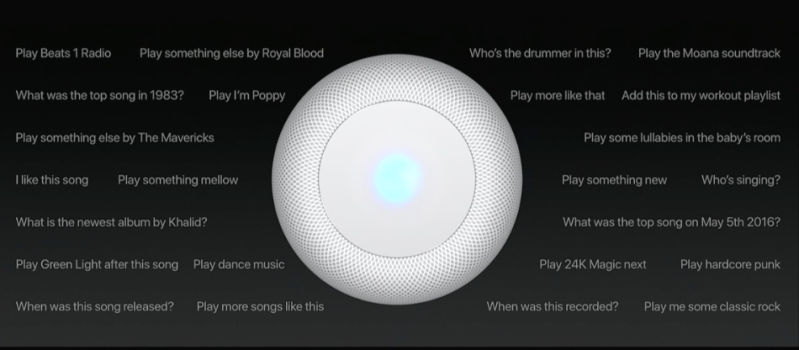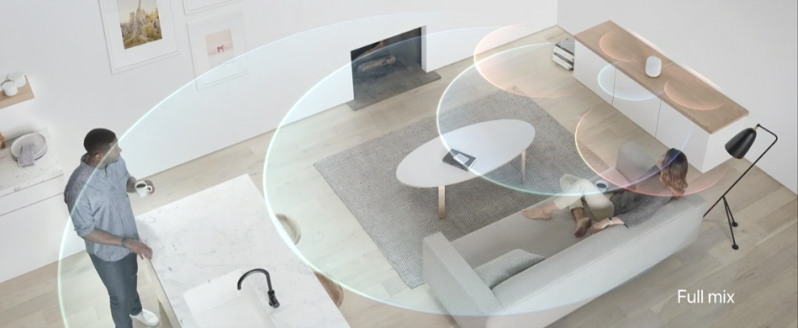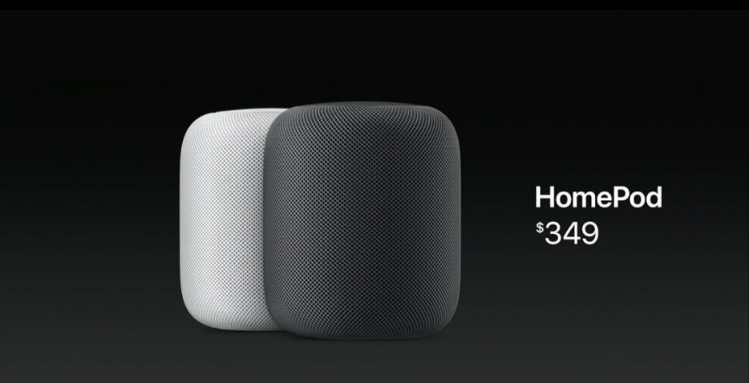Apple today announced plans for a smart speaker named HomePod to compete with Amazon Echo, Google Home, and other smart speakers. The device, which should be released at the end of this year, will be available in white and space grey and will retail for $349. HomePod will also be spatially aware to improve music quality.
The HomePod will first be available in December to customers in the U.S., United Kingdom, and Australia. Manufacturing of smart speakers with Siri inside reportedly already started in Taiwan, Bloomberg reported last month.
Standing seven inches tall, the device is lined with a mesh fabric similar to the base of the Google Home or exterior of an Amazon Tap. Six microphones are used to listen for the “Hey Siri” activation, while a seven-tweeter array gauges sound quality. HomePod will be powered with an A8 chip, the same that powered the iPhone 6.
The HomePod reveal was the final announcement during the keynote address today at WWDC, the Apple annual developer conference being held June 5-9 at the San Jose Convention Center in San Jose, California.
June 5th: The AI Audit in NYC
Join us next week in NYC to engage with top executive leaders, delving into strategies for auditing AI models to ensure fairness, optimal performance, and ethical compliance across diverse organizations. Secure your attendance for this exclusive invite-only event.
Just as Siri does on other devices, on the HomePod it can talk about topics like sports, serve up news, or control smart home devices. On HomePod, Apple VP Phil Schiller said, Siri will also be able to act as a “musicologist” able to respond or learn when a person says things like “Who’s the drummer in this?” or “I like this song.”
“This is free-form. Siri doesn’t need a specific list of commands. It can interpret what you’re saying and help you discover the music you love,” Schiller said.

Though intelligent assistants are now able to do a range of tasks, music is still one of the most important parts of the experience. A VoiceLabs survey of smart speaker owners found that more than 40 percent of activity with the AI-powered devices is still related to playing music or books.
With the new iOS 11 due out this fall, Apple announced today, Siri will get a more expressive voice and be able to carry out actions with more apps, like OmniFocus 2 and WeChat. A Siri Watch face that learns your habits is also coming soon.
Over the course of the past year — which saw booming interest in bots and artificial intelligence — Siri has largely been overshadowed by competitors like Microsoft’s Cortana, Amazon’s Alexa, and the Google Assistant, each of which has opened up to third-party developers.
In recent weeks, AI-powered assistants from Amazon and Google gained the ability launch call and messaging services or announced plans to do so, and with the launch of Lens for Google and Echo Look, both companies have taken steps to introduce computer vision.
Derived from the work of voice actress Susan Bennett, the Siri intelligent assistant first made its debut in 2011. While Siri is one of the first modern voice assistants, Apple is one of the last of the tech giants to release a smart speaker, following Amazon Echo in November 2014 and Google Home last year.
Apple certainly has some catching up to do: An eMarketer forecast last month predicted that Amazon is expected to command roughly 70 percent of the smart speaker market share this year, with Google Home taking much of the rest of the market.
As VentureBeat’s Chris O’ Brien recently pointed out, Apple has a steep hill to climb, but it’s been done before. The iPod, iPhone, and iPad weren’t the first devices of their kind to be released. They were just the best overall.
Siri’s name recognition could play a role in HomePod adoption.
A USA Today poll published today found that 80 percent of consumers are familiar with Siri, compared to 67 percent for Alexa and 55 percent for Google Assistant. The poll also found that Siri is already used more often than intelligent assistants like Cortana, Alexa, and Google Assistant.
Siri is now available on 375 million devices, Apple VP Craig Federigh said onstage today.

Above: A visualization of HomePod spatial awareness, from the WWDC 2017 keynote address.
Siri has been able to add events to calendar or answer random questions for a long time, but at WWDC last year, Apple announced plans to open Siri up to interact with apps, a feature that first became available in September with the launch of iOS 10. Since then, Siri has been able to do things like send WhatsApp messages and search for LinkedIn Learning courses with voice alone. iMessage apps and the iMessage App Store also debuted with iOS 10.
Siri’s limited approach to app integrations runs counter to those taken by Microsoft, Amazon, and Google, who have invited developers to create their own third-party voice apps.
While other tech giants have opened their products to a range of third-party voice apps and new features, Apple initially chose to limit Siri’s functionality when working with third-party software. Today, there are more than 13,000 Alexa skills and hundreds of Google Assistant actions, but only a handful of apps that have integrated with Siri.


